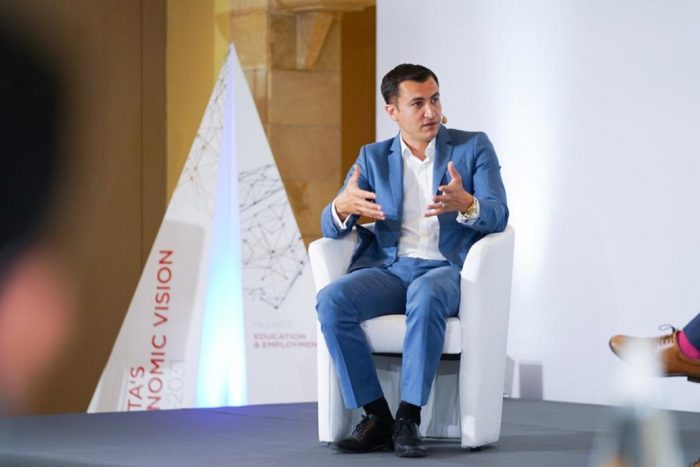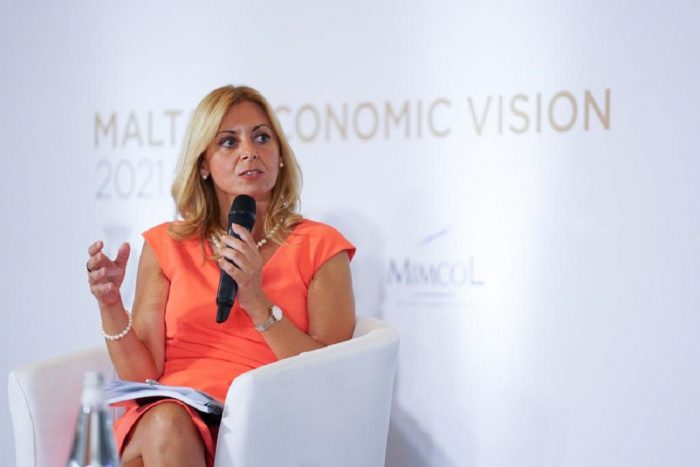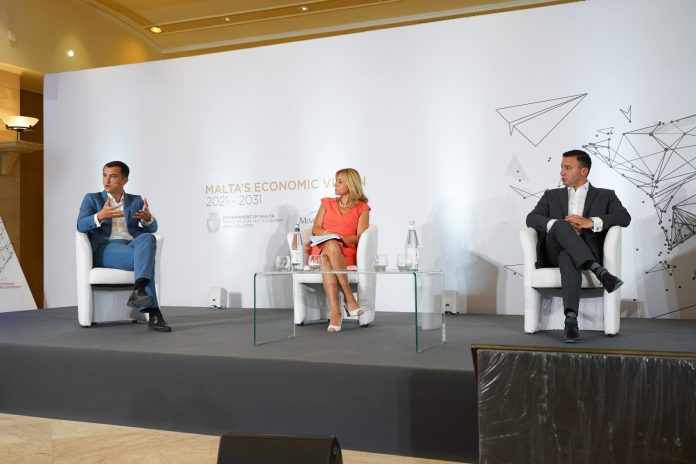Ministers Justyne Caruana, Silvio Schembri and Clayton Bartolo address Malta’s Economic Vision 2021-2031, National Consultation on Education and Employment, and emphasise that Malta’s biggest challenge is not the economy’s growth but the sustainment of human talent and the attraction of the best global talent
The government is currently in discussions with private industry and unions, to identify the skills shortages these are experiencing in human resources, while simultaneously working with educational institutions to close this skills gap through the introduction of new courses. This will ensure that the necessary skill requirements are being addressed and that young people find quality employment in the industry. This was stated by Minister for the Economy and Industry Silvio Schembri, in one of a series of seminars which are discussing each of the five pillars described in the document of the Economic Vision 2021-2031 for Malta for national consultation. The session, organised by MIMCOL, addressed the third pillar of the document – Education and Employment, which was attended by Minister for Education Justyne Caruana and Minister for Tourism and Consumer Protection Clayton Bartolo. Stakeholders hailing from government entities, civil society and non-governmental organisations participated in the event.
“Malta’s biggest challenge is not the growth of the economy but the sustainment of its human talent and the ability to continue to attract the best global talent. Malta must provide the necessary conditions under which human capital can acquire the knowledge and skills needed to build the economy of the future. This while creating high quality jobs and conditions and ensuring that it remains attractive as the natural home for global talent,” said Minister Schembri.

Minister Schembri noted that as economic trends change, in particular as we move rapidly towards the industrial revolution 4.0 which is based on advanced digital technology, the skills required are also moving in parallel with this development. “There are new demands on the market, and we need to identify these better, understand what the industry actually needs, discern the advantages and opportunities that this scenario has generated, which will ultimately combine a dynamic education and employment environment,” said Minister Schembri.
He outlined a concrete example with the manufacturing sector. While previous administrations predicted that this sector would decline, during the pandemic it not only showed its resilience but also adjusted to modern times, which led to several factories increasing their operation and production capacity. “A sector that has traditionally been dominated by people-driven processes – today, these are automatic, more efficient processes, run by these same employees but with more advanced training,” Minister Schembri added.
The Minister for the Economy and Industry also stressed the importance of businesses and start-ups in the Maltese economy, and encouraged educators to instil from an early age an affinity for entrepreneurship in children which, with the advancement in technology, is offering innovative sectors including in the digital field. He urged young people to not be afraid of the risks of pursuing careers in entrepreneurship, because that is the foundation of success.
Regarding global talent, Minister Schembri said that Malta is extremely attractive due to its climate, culture, English language, strong digital infrastructure and competitive incentives. He said that these foreign experts are important to the Maltese economy because they continue to nurture local talent by sharing their vast experience abroad.
Minister for Education Justyne Caruana’s intervention covered the newly launched National Strategy for Digital Education and Transversal Skills and vocational education and training (VET). “Our task is now to transform the current challenges into opportunities to acquire the know-how for a seamless transition from face-to-face to online learning,” said Minister Caruana, referring to the need for greater reliance on digital platforms to ensure continuation of lessons and learning, as highlighted by the Covid-19 pandemic.

Speaking about VET, Minister Caruana said, “If we focus on MCAST, it is revisiting its Strategic Plan aimed at continuing to improve the learning and working experience of students and staff members on multiple fronts. The government will be supporting industry to encourage the take-up of apprentices during these challenging times, with an investment of €2.75 million for students to be given apprenticeship opportunities.” Minister Caruana also mentioned the consultation being carried out with the Ministry for Finance and Employment to come up with a well-structured National Skills Council, which will include collaboration with employer bodies.
Commenting during the event, Minister for Tourism and Consumer Protection Clayton Bartolo pointed out how within certain economic sectors, in particular within the hospitality sector, there should be an important emphasis for our country to embrace a quality experience for both domestic and foreign tourist. “In a world that is constantly changing, quality must be the order of the day. The tourism sector is an important pillar in the present and future economy. Our job is to continue to improve our product so that Malta truly becomes a centre of tourism excellence,” stressed Minister Clayton Bartolo.

The economic vision document stresses that in order for Malta to become ‘future-proof’ in the Education and Employment sector by 2031, various measures must be implemented, namely:
• Designing the future skills framework and prioritising closing skills gaps;
• Aligning educational curricula with the skills required for tomorrow’s economy;
• Establishing Malta as an International Centre of Excellence in Education;
• Rebuilding and enhancing the skills required for tomorrow’s economy;
• Attracting and retaining diverse talent while curbing the brain drain of top talent.
All those interested in participating in the national consultation process can visit https://economicvision.mimcol.com.mt/ to submit their comments.
The consultation process will remain open until 31st July 2021.
Photos: MEI, MFED, MTCP, DOI










